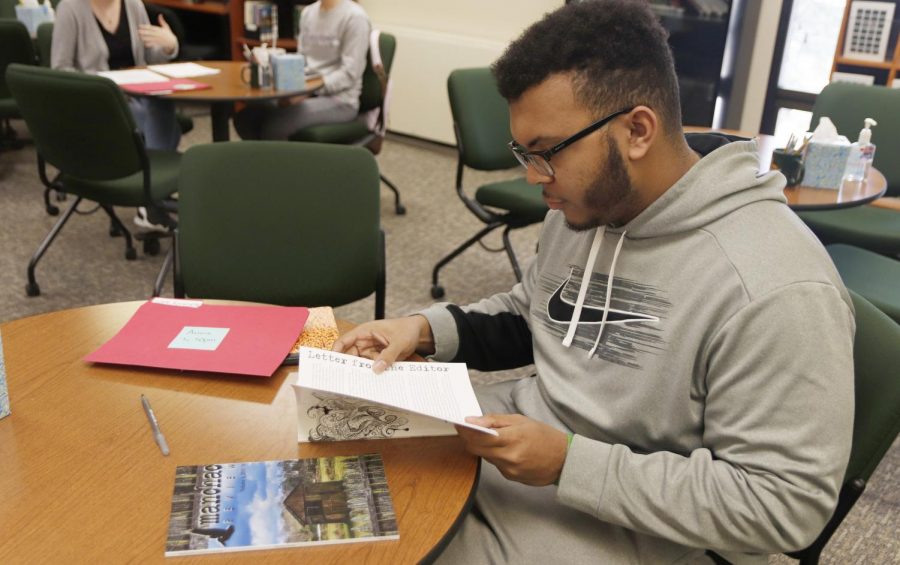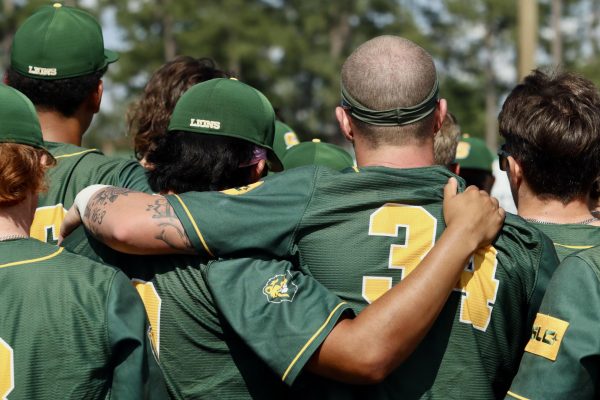A desire for getting published
Prakriti Adhikari/The Lion’s Roar
Roosevelt White, a freshman art major, reads “The Manchac Review” at the Writing Center. The creative magazine is published annually, and students with any major can submit their applications.
Students interested in creative writing can have their articles published through the university’s annual journal.
“The Manchac Review” showcases works from students across campus in three main genres: fiction, poetry and drama.
Editor of “The Manchac Review” Samantha Reine, a graduate student in English, explained that photography and music pieces are also accepted to be published online.
“What we like to publish is anything from poetry to flash fiction,” said Reine. “We do short stories. We also do photography, and we also like to publish personal pieces of music, but we cannot put that in the physical journal. So, we publish it online.”
Applications are accepted all year. Students from any major can submit their applications.
“They don’t have to be an English major, which a lot of students believed that they had to be an English major to submit, and you don’t have to be,” said Reine. “You can be a music major, an art major, a history major that just decided to write a poem or decided to draw one day.”
Editors for the magazine are appointed by the director of the Writing Center, and they are responsible for proofreading and editing the submitted pieces. The journal is published under the Department of English.
Submissions for the journal can be made either online through “The Manchac Review” page on the university website or by emailing manchacreview@selu.edu. Students’ works are judged on quality, content, creativity and originality. The editors do not want submissions to include bigotry or bullying.
“I do try to stay away from anything that’s gonna be racist or political,” explained Reine. “I am perfectly fine with poetry that may talk about how racism is a problem, or it’s a situation. But as far as someone writing something racist or something harmful or anything like bullying, any cussing or cursing, I stay far from that.”
After a submission is made, the editorial team sends an email confirming the submission and lets students know whether or not their submissions are accepted. Accepted applicants are requested to complete a submission form at the Writing Center.
During the editing process, the author will be informed about the edits made including spelling errors. Reine explained some of the editing processes.
“With poetry, we do have to be careful sometimes because people will intentionally do things,” said Reine. “So, you always wanna make sure that you ask all the questions so that if they intentionally do something, you don’t take it out from the poem. As far as short stories or flash fiction pieces, we want to make sure that it makes sense, that it’s not some confusing mess, and we’ll ask questions. They’ll answer.”
Reine encouraged students to submit their applications.
“It’s a great opportunity to get yourself published,” said Reine. “It looks great on an application to say that we have things published. Even if we tell them ‘Sorry, this is not what we are looking for,’ keep submitting, keep trying because any English teacher, especially the creative writing teachers, are going to tell you that they submit to journals all the time and are denied, but you can’t let things like that stop you.”
Your donation will support The Lion's Roar student journalists at Southeastern Louisiana University.
In addition, your contribution will allow us to cover our annual website hosting costs.
No gift is too small.

Prakriti Adhikari is an accounting major and an international student from Kathmandu, Nepal. Adhikari has been working with The Lion's Roar since Fall...






